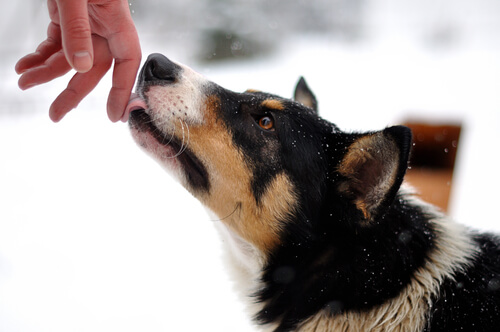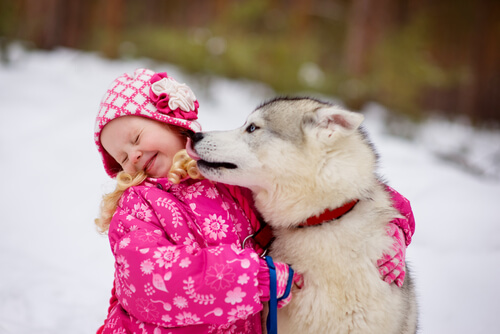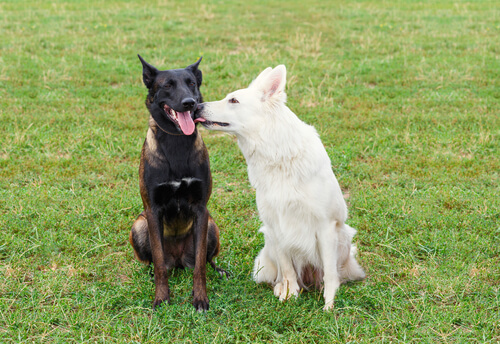What Does it Mean When a Dog Licks You?

Dogs have different ways of demonstrating their love, loyalty and obedience to us. One of these ways is to lick us. Doggy “kisses” are one of these ways.
But what does it mean when a dog licks you? The reality is that dogs lick for different reasons, and when they start using their tongues, they are trying to transmit different messages.
First, we must begin to understand a dog’s motivations for licking. Then, we can look at the reasons.
Dog licking shows humility and submission

When dogs walk in groups or herds, one way to show admiration for their leader is through their kisses. It is possible that dogs also use this communication and social behavior to communicate with their owners.
As an owner, we feed our dogs and give them a safe place to live, and a schedule that he learns to obey. It is clear that our pets think of us as their guides, and show us respect by licking us with devotion and humility.
Licks on the hand can be synonymous with admiration.
When an animal is unwell
This is one of the reasons why we should be aware of our dog’s use of his tongue. Sometimes it means that he feels bad, and expresses it through licking. If his eyes are sad and he looks apathetic, the licks are a wake-up call.
If, on the contrary, the animal licks a part of his body, it’s because he might feel pain in the area where he applies saliva.
We’re not talking only about open wounds. He can lick himself when experiencing an allergy, an internal bruise, or even an infection in some superficial glands. If something hurts, he’ll try to pamper himself with his tongue.
Dogs try to console us by licking
Dogs can perceive our moods. Some studies say that they know very well if we are sad, upset, or depressed. When our mood change is noticeable, our pet will go to comfort us with some “repairing kisses”.
Even if we are somewhat nervous, our pet will notice and try to express that he is on our side, and comfort us. When this happens, he will seem nervous or anxious, because he’s trying to transmit happiness and get your attention in a clear way.
The truth is that licking is one of the most deeply rooted communication methods that our friendly four-legged friends possess.
Dogs show us their love by licking
It’s clear that everything we said above can only mean one thing: our pet loves us! The fact that a dog licks is a way to express love and attachment. In the case of licking strangers, licking is an act of camaraderie with which dogs show friendliness.
The frequency with which a dog licks gives us an idea of his personality. Some lick everyone, and that is why they can be considered playful, friendly, and affectionate. Others only lick their friends once in a while.
Why do dogs lick themselves?
Just because the dog licks himself, doesn’t mean he’s sick. In fact, he may lick his legs, genitals, and other parts of his abdomen if he feels they are dirty. It is normal for dogs to do that when they step on mud, or sticky substances.
As you can see, this cleaning system is similar to what cats do to clean themselves. However, it is obvious that dogs do not do it as thoroughly as cats. Unlike cats, dogs are not so afraid of water.
Afraid of infection after a dog licks you?

Some people like to have dogs, but limit the physical contact they have with their loyal friend. We’re talking about owners who do not want to be licked in the face, or who prevent the dog from climbing on them.
According to a scientific study conducted at the University of Arizona in 2015, dog owners who have direct contact with their pets are happier, and enjoy better health than those who don’t. Apparently, these people’s bodies are less prone to disease.
The hypothesis is that the microbes present in the stomach and saliva of dogs strengthen our immune systems.
